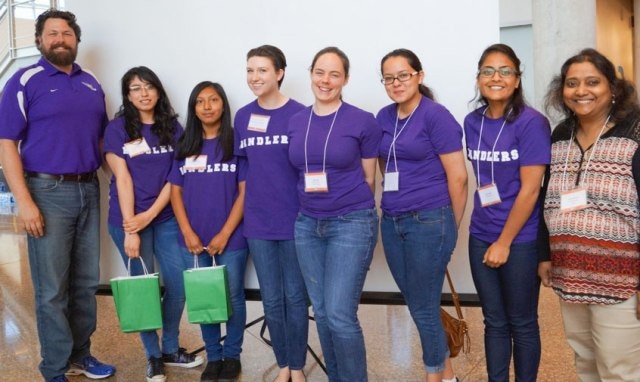Jul 5 2016
By building a robotic arm that can lift and move objects using magnetic sensors, a team of Richardson High School students took first place at the annual Young Women in Science and Engineering (WISE) Investigators program.
 The first-place team from Richardson High School (from left): Teacher coordinator James Clay Stanfield; students Ada Zuñiga, Cecilia Dieguez and Miranda Gavitt; Texas Instruments industry mentor Molly Singh; college mentors Julita Briones and Fizza Mahdi; and Ericsson industry mentor Bamini Vittal.
The first-place team from Richardson High School (from left): Teacher coordinator James Clay Stanfield; students Ada Zuñiga, Cecilia Dieguez and Miranda Gavitt; Texas Instruments industry mentor Molly Singh; college mentors Julita Briones and Fizza Mahdi; and Ericsson industry mentor Bamini Vittal.
The Young WISE Investigators program was established in 2012 to encourage young women from the Dallas area to pursue careers in science and engineering. During the yearlong program, the students build their skills through hands-on STEM research and mentoring. They compete in teams to design, develop and implement an innovative solution to a science and engineering problem.
The teams’ research culminated at a recent poster competition at UT Dallas. The budding researchers explained their work to a panel of judges, mirroring the research process at the college level. The judges, composed of industry, faculty and postdoctoral experts, evaluated each team on its knowledge of the subject matter, application of the scientific method to conduct a valid experiment, and written and oral communication of its research.
After the competition, participants were recognized at a celebratory luncheon with their families, mentors and UT Dallas faculty. The top three teams were awarded scholarships to attend UT Dallas. Texas Instruments engineer Ruchi Shah, a former Young WISE college mentor, delivered a keynote speech about opportunities for women in science and engineering fields, and shared her career experiences.
The first-place team from Richardson High School showed that magnetic sensing is an efficient way for robots to interact with their environment. The results could have applications in assembly line manufacturing and search-and-recovery operations.
Second place went to a team from Berkner High School in Richardson that explored the intersection of fashion design and technology by using a flexible polyurethane filament to 3-D print fabric. Third place went to a team from Hillcrest High School in Dallas that engineered a solar-powered charging station for phones.
The level of competition was highlighted by the judges’ difficulty in selecting the top three projects and their praise for the teams.
“The solar-powered cellphone charger is an innovative and thoughtful experiment conducted with compassion and rigor,” said competition judge John Harkins, principal communication systems engineer at Boeing. “I especially appreciated the passion with which the team tackled the experiment.”
This year, UT Dallas college mentors, staff and faculty worked with teachers and administrators at eight participating schools to recruit, engage and mentor students. Fifty-one high school and three community college students participated in the program — 44 female and 10 male students.
Each team was assigned a UT Dallas student mentor, a teacher mentor, a UT Dallas faculty mentor and an industry mentor to guide them in their work and offer insight into college and career paths. The UT Dallas student mentors included 26 female students and postdoctoral researchers.
Industry mentors included volunteers from Texas Instruments, Ericsson and Cisco.
Dr. Magaly Spector, professor in practice, assistant to the provost and the founder of the program, anticipates more growth as the program enters its fifth year.
“Each year, the Young WISE Investigators program has continued to improve, strengthening its model and its effectiveness in helping to narrow the gender gap in STEM innovation and achievement,” she said.
“The program team looks forward to continuing upon this trajectory by broadening participation to more schools and students, deepening connections with high school STEM teachers and curricula, and creating more structured opportunities for young women to learn firsthand how they can advance science and engineering research to improve the world around them.”